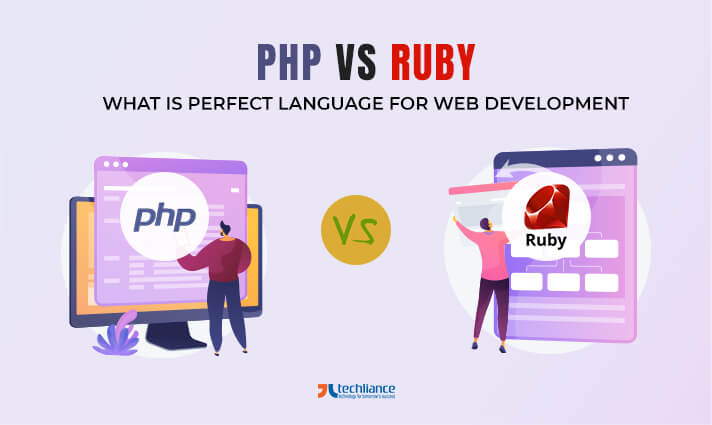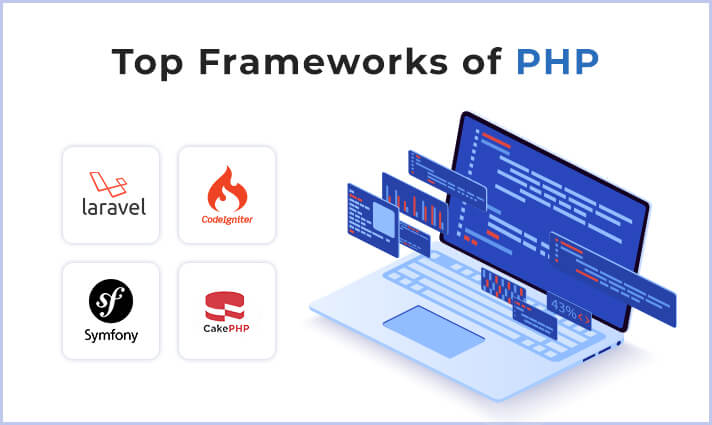When it comes to specialized web development solutions, PHP and Ruby both have been dominant programming languages used by developers. The debate between PHP vs Ruby has been going around for a while.
PHP is a scripting language ideally used for web development while Ruby’s lobby talks about it being simple in construct. Ruby has always been about writing the plainest code in the most regular English-like syntax. However, this does not mean that the language itself is easy to learn.
Throughout the world, PHP and Ruby are among the most used computer languages for custom web development services. In order to start off our PHP versus Ruby showdown, let’s take a look at the benefits and drawbacks of both languages.

Pros of PHP
With a huge developer community, PHP has lots to offer including packages, libraries, support, and frameworks. It provides multiple ways to approach the problem through coding. The realm of PHP is made of Eclipse, NetBeans, PhpStorm, Aptana, and many, many more IDE-s that might come in handy depending on the complexity of the project.
PHP is a lot faster than Ruby. It remains a popular choice even for beginner programmers as it’s easier to learn. It has an adequate number of tools and editors in comparison to Ruby. It is also cost-efficient as the developers you can hire for web development services in PHP cost a lot less, as compared to Ruby developers.
The following are the most popular frameworks that make website development in PHP easy.
- Laravel — The most popular PHP framework, Laravel has an MVC pattern.
- CodeIgniter — Noted for its speed and performance in comparison to other PHP frameworks; this is a relatively simple and elegant framework for PHP.
- Symfony — As an open-source PHP framework, Symfony speeds up the maintenance and creation of web apps.
- CakePHP — Based on Ruby on Rails concepts and principles; this framework was written for faster development.
If there is a head-to-head battle between PHP and Ruby frameworks, then Laravel wins over Ruby on Rails hands down. It is because it provides higher efficiency in processing the code. Especially for web applications such as Facebook, Twitter, etc. where there is rapid processing of multiple requests at a singular time; code efficiency matters.
Laravel’s development speed is extraordinarily fast however Rails is focused on faster project delivery. That’s why Rails is used for startups and MVCs. PHP’s popularity remains all-time high. Even the number of resources in the developer community continuously increases. Therefore, the training material for learning the language also increases alongside the patronage from the community to the new developers who take up the language.
80% of the websites are made with PHP. Need we say more? It’s the language that is dictating how web applications will be developed and eventually evolved in the future. Any language that is so extensively used for programming also gets more focus on new constructs, better processing, and various new ways of being improved for the better.
Some of the top websites made in PHP include the following.
- Yahoo
- Wikipedia
- Flickr
- WordPress

Cons of PHP
Error handling is poor and since coding is easier to do; the language is weak in terms of designing constructs. At times, PHP is called the language that produces “spaghetti code” because the code gets tangled with itself and the developer goes back and forth to make several edits and rewrite the code to make it workable and produce the desired results.
PHP developers often transition from learning PHP and then moving to Ruby, however, it’s never the other way around. In continuation with the PHP versus Ruby on Rails topic, let’s take a look at the advantages and disadvantages of Ruby now.
Pros of Ruby
With clear and elegant syntax, Ruby has better usability. With meta-programming, it allows more to be achieved through lesser code. Since Ruby has been in the industry for more than 20 years, you will find a huge domain of expert-level resources in the market. You get higher maintainability of the produced code by these developers.
The following are the main frameworks of the Ruby language.
- Ruby on Rails — This is “the” framework for Ruby. It has an MVC pattern and is widely used for by the developer community for coding in the Ruby language.
- Sinatra — The not-so-popular Ruby framework, provides means for quicker creation of web applications with minimal effort. This is a framework chosen for the development of smaller applications.
Ruby allows automation of code production and deployment. The fan following for Ruby is more loyal and committed as it focuses mostly on Ruby on Rails. The document and training collateral for Ruby are mostly self-documentary while PHP packages require additional explanations. Ruby’s syntax is just like plain English which makes Ruby easier to understand over PHP.
Although Ruby stands on 4th position as the choice for website development, but it’s the fastest growing web development language and is the force behind following websites.
- Airbnb
- Shopify
- Basecamp

Cons of Ruby
Talking about shortfalls, Ruby is slower than PHP version 7. Despite its clear syntax, it’s harder to learn. It is never the first choice for newbie developers to learn. Only the seasoned developers get their hands dug in in Ruby. The server support for Ruby/ Rails is not that higher either.
Read more: Comparison between PHP and Python
Closing remarks
When it comes to Web Development Services, it is not right to compare two languages without looking at the frameworks behind them. Similarly, PHP vs. Ruby comparison cannot be a standalone battle without looking at various aspects including their associated frameworks, developer community, support, extensibility, features as well as limitations.
Both these languages have been in the market for more than two decades. This itself is a big advocate of how the languages have survived over time with continuous support from their respective developer communities. Even today, some of the most powerful web applications are developed in these languages.
In terms of their frameworks, PHP’s Laravel holds out its own against the mighty Ruby on Rails which has been in the market for a longer duration. Ruby on Rails is ideal for startups or MVPs, however, Laravel has extensive performance and code efficiency that makes it a notable candidate as well.
The choice between the two languages is predominantly decided by the type of project you are about to take up. At times, the only deciding factor is your team – the resources and their credibility in producing a code that is worth all the time, effort, and cost put up by you in this entire excursion.
The right blend of programming resources is all that it takes to make or break your product. In order to have the most ideal choice of the team at your disposal for bespoke website development, feel confident to discuss with Techliance in detail today.

PHP vs Ruby – FAQs
The following are the most frequently asked questions (FAQs) that help in a thorough PHP vs Ruby comparison.
In terms of popularity, PHP surpasses Ruby on Rails because the latter is a web framework, not a programming language. Ruby is the language behind the Ruby on Rails framework. PHP is the language for writing language. In this context, PHP is better than Ruby/Ruby on Rails.
Although more difficult to program into, Ruby is a more robust language for creating business applications. PHP is more aligned towards creating web applications while Ruby has more to offer.
PHP is not an object-oriented language, so coding is harder and at times requires more time as well. Ruby requires lesser time in building and testing as well as reduced deployment time.




